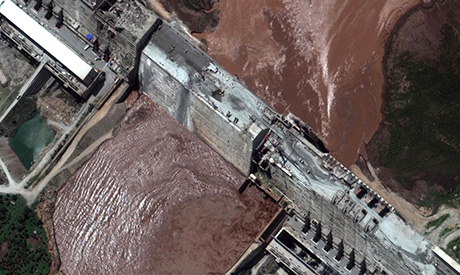
(FILES) This file handout satellite image obtained courtesy of Maxar Technologies on July 21, 2020 shows a view of northwestern Ethiopia that focuses on the status of the Grand Ethiopian Renaissance Dam (GERD) and the Blue Nile River on July 11, 2020. AFP
The Ethiopian foreign ministry said a “win-win” solution to its dispute with Egypt and Sudan over the Grand Ethiopian Renaissance Dam (GERD) is still within reach, but that Addis Ababa will not sign any permanent, legal agreement on the massive dam, Al-Jazeera reported.
Ethiopia’s foreign ministry spokesman Dina Mufti said in a press conference on Thursday that Addis Ababa is ready to resume the GERD talks whenever the African Union, which sponsors the negotiations, decides.
Tensions between Sudan and Egypt and Ethiopia were aggravated earlier this month after Ethiopia informed Egypt and Sudan that it had started the second phase of filling the dam’s reservoir, a step that the two downstream countries have condemned.
Ethiopia said this week that it has completed the second stage of filling the dam’s reservoir.
Egypt and Sudan call for a binding deal on the filling and operation of the dam that they say would save their water rights and protect their people against potentially significant harm.
Their demand has been met with Ethiopian resistance, leading rounds of AU-sponsored talks to collapse and causing Egypt and Sudan to resort to the United Nations Security Council earlier this month.
During the press conference, Mufti affirmed that the second filling did not cause any significant harm to Egypt and Sudan.
Mufti also hailed Egyptian President Abdel-Fattah El-Sisi’s statements on the GERD earlier this month as "positive," affirming his country's support for the cooperation and joint development called for by President El-Sisi.
On Thursday, Ethiopian Prime Minister Abiy Ahmed posted a tweet in Arabic claiming that the second stage of the filling will not cause any harm to the downstream countries.
“To my sisters and brothers in the downstream countries, the second filling of the Grand Ethiopian Renaissance Dam on the Abay River (Blue Nile) took place on the 20th of July 2021, and as I promised you in advance, on the 9th of July, Ethiopia filled its dam during the rainy season with caution and in a way that is beneficial to reduce flooding at the direct downstream country,” Ahmed said.
He claimed that the dam “will remain a real gain and a symbol of joint growth and cooperation."
Egypt and Sudan have warned of the negative impact of completing the filling over the coming years without a binding agreement and highlighted the risks it can cause to people and agricultural lands.
Egypt’s Foreign Minister Sameh Shoukry said in a speech at a Security Council session on the GERD that the project may lead to a cumulative shortage of water estimated at 110 billion cubic metres.
He also warned that this shortage will make it harder for Egyptians to obtain clean drinking water and will deprive millions of agricultural workers from obtaining enough water for their lands.
Shoukry said this may cause the destruction of thousands of feddans of arable land.
The Sudanese Foreign Minister also addressed the UNSC, saying the filling and operating of the dam without an agreement threatens the lives of millions in Egypt and Sudan.
Short link: